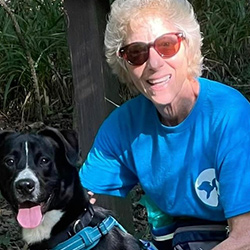By Callie Carlucci
Bernice has a catchy mantra to describe her work with animal rescue: “I don’t rescue dogs, dogs rescue me.” I think most dog people know exactly what she means. Dogs give our lives meaning in a way that isn’t necessarily describable. Maybe it’s the unconditional love that they exude; however, many canines are in shelters and have suffered from neglect, abuse, and instability. Bernice’s mission is to help these dogs find their forever homes, especially the ones who are behaviorally challenged.
As a retired physician, Bernice decided to commit her newfound time working with animal rescues in Middle Tennessee, including Metro Nashville Animal Care and Control, Animal Rescue Corps, and Williamson County Animal Shelter. She describes that as a child, she was never allowed to have pets, but she loved animals and thought she’d become a veterinarian. Now in her retired life, she is spending seven days a week at the shelter, watching “dogs become dogs again,” as she likes to say.
Post-Covid, there was an influx of dogs living in shelters. In 2020, many people adopted dogs as companions while they were able to work from home, but with people returning to the office, inflation, and all the changes happening in the last couple years, many of those “Covid pets” are ending up in the shelter. “People had to start surrendering dogs they couldn’t afford,” Bernice says.
Now more than ever, Bernice encourages us to get involved with our local animal shelters. She notes it can be emotionally challenging to walk through a shelter for some people, but there are so many ways to help outside of the shelter. At Williamson County Animal Shelter, Bernice helped with “play groups,” where they had the shelter dogs play outside, get out the “zoomies,” and socialize. Some shelters also allow volunteers to take a dog out for the day – hiking, soccer games, or other dog friendly events. “I took them to a music event at the local park wearing their adoption vest, and got them adopted just by walking around,” Bernice says, and remarks this is a hugely effective way to get animals adopted.
Additionally, fostering is a great way to volunteer, “Fostering is a really big deal. I have friends who can’t walk into a shelter, but they have no problem taking a dog or a kitten,” Bernice notes this is a great way for those who find animal shelters to be emotionally challenging. Fostering is also great for socialization, and helps the dogs become more “adoptable.”
It is clear from her continuous commitment that Bernice is a champion for canines. Her work is inspiring, and I can only imagine the joy she feels when she watches one of her canines leave to shelter for their forever home.
To hear more about Bernice, listen to her full interview on the Doing Good Podcast.

